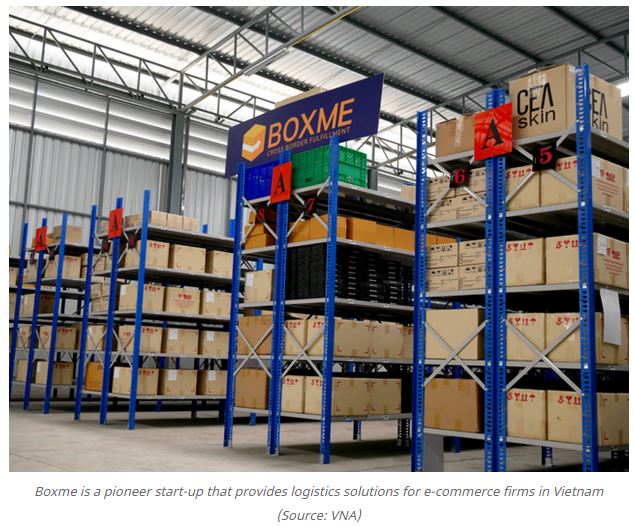Vietnam: Investing in automation to help VN logistics firms compete
As the pandemic brings opportunities to the e-commerce sector, the local logistics industry also has a chance to grow.
According to a study by Jones Lang Lasalle Vietnam Co, Ltd (JLL), traditional brick-and-mortar retail outlets have suffered as countries implement stay-at-home and social distancing policies
“Certainly, the dependence on e-commerce will explode and will change the behaviour of online consumers, so the logistics sector will play an extremely important role,” general manager of JLL Vietnam Stephen Wyatt said, adding “China’s supply chain disruptions in February and March are valuable lessons for future business plans.”
E-commerce platforms are racing to seize golden opportunities at this unique time. Grab, often considered Southeast Asia’s super app, started testing its latest GrabMart service for users in HCM City in March, while Tiki Vietnam reported receiving 4,000-5,000 orders per minute at peak hours.
As the second fastest growing e-commerce market in Southeast Asia, after Indonesia, Vietnam has set a target that the e-commerce industry would grow by 25 percent per year to reach 35 billion USD with more than half of the population shopping online by the end of 2025.
The Government targeted that 55 percent of the country’s population would do online shopping by the end of 2025 and the average spending for online shopping would be about 600 USD per person per year.
According to the e-Commerce White Book 2019 by the Vietnam e-Commerce and Digital Economy Agency under the Ministry of Industry and Trade, e-commerce revenue jumped 30 percent from 6.2 billion USD in 2017 to 8.06 billion USD in 2018. About 39.9 million people shopped online in 2018, up by 6.3 million people against the previous year. Average spending for online shopping was 202 USD per person in 2018, 16 USD higher than in 2017.
At the same time, the e-Conomy SEA 2019 report by Google and Temasek predicted that e-commerce in Vietnam would expand 43 percent per year in the 2015-25 period, making Vietnam the fastest growing e-commerce market in the region.
Stephen said e-commerce logistics was labour-intensive in the past, however, now new technologies such as AI, machine learning, and IoT have allowed for greater automation and increases in productivity, as well as better utilisation of space.
The JLL leader said: “It is a driving force to reduce virus transmission,” adding that a lot of warehouse systems have recently employed robots to process, select and package goods as robots can work independently and efficiently for jobs of high volume and continuity.
Seeing the importance of using robots in logistics work, JLL does not see such facilities in many warehouses in Vietnam.
Xuan Pham, Marketing Director of JLL, said the local industry was still quite backward compared to the growth rate of technology in Vietnam, adding: “It is time for stakeholders to conduct redevelopment and upgrade to have smart and highly automated warehouses to meet growing consumer demand in the country.”
Han Van Loi, CEO of Boxme, a pioneer start-up that provides logistics solutions for e-commerce in Vietnam and other countries in Southeast Asia confirmed his firm’s revenue was still growing 45-50 per month during the pandemic.
With five years of operation in Southeast Asia and partnerships with China, the US and Hong Kong, Loi said “Compared to the region and the world, we are still lagging behind in terms of logistics technology.”
Loi added while the world has used the 5PL logistics service that manages all stakeholders in the distribution chain on e-commerce platforms for many years, the use of technology in Vietnam was still much lower.
The CEO said if local firms wanted to compete, they must make an effort three to five times bigger especially after increasing e-commerce use after the pandemic.
He also mentioned the higher competition from foreign firms to Vietnam when they realise it as a “promising land” of e-commerce. With strengths in capital and better technology, foreign firms could dominate the market.
Loi said: “Local firms will face the risk of being eliminated from the game if they don’t develop well.”
The CEO said the local infrastructure system for logistics services has not received investment, or upgraded proportionately and in accordance with the requirements of fast and modern development, leading to expensive transport costs and reducing competitiveness.
In this case, Xuan from JLL said: “Investing in automation will make sense in the long run because the cost of applying technology to warehouses is quite expensive. In the case of another contagious scenario in the future, factories with high technology will certainly overcome the challenge more smoothly.”/.VNS
Source: https://vietnamnet.vn/en/business/investing-in-automation-to-help-logistics-firms-compete-657589.html


 English
English




